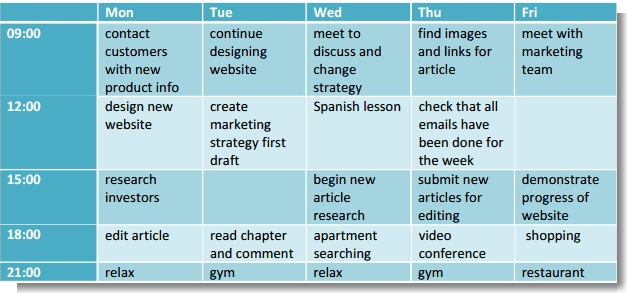One week in a start-up… making a good time management plan
It’s been a hectic but educational week at Twoodo, so developing a good time management plan is a top priority for the team. Demo Day is edging closer and closer and it is at times like this that time management is crucial.
It didn’t take long to notice that sleep was less difficult to come by as my mind was filled with questions about tasks that demanded answering. Receiving emails at 4am and 6am told me that my new team was also wide awake, trying to squeeze the most out of every day.
There was a lot to take in, and barely a moment to absorb it all. Every decision now is seen as a make-or-break move that will affect the outcome of Demo Day. The Twoodo tool offers the option of adding a priority to your task: low, medium, high or critical. Time-wise this is understood amongst the team as whenever you have free time, within the week, within two to three days, and right now/tomorrow at latest. Is this enough for good time management?
This still leaves the ambiguity of what each team member considers as more important, and this can potentially lead to a list of 10 critical tasks demanding your attention at once.

Good time management, bad time management…
The key to answering this problem is maintaining a transparent relationship with your colleagues. A small team cannot work any other way. When a list of over five critical tasks hits your list, a discussion needs to be had over the real priorities whether by commenting on the tasks or a quick video conference (for virtual teams). Each member of the team should know what the most important overarching goals are and mutually agree to what the best route to get there is.
When assigning priority to your tasks or those for your teammates stop a moment and think about where it fits into the “big plan”. Is there a crucial deadline approaching that requires this action to be taken immediately? Or is it simply a novel idea that could be experimented with at a later time? There is always something important for a start-up to be doing, always critical decisions to be taken, always a moment when the carpet can be pulled out from under your feet.

Burnout is avoidable. Whilst working hard and giving every ounce of effort you possess is admirable, (and downright compulsory during the first five years of the company) it will all come to nothing if you lose the creative energy that got you started in the first place. You might start to forget that there’s a world outside of your innovative product. You’ll stubbornly refuse to accept that the market has changed and people want something else now. You won’t be able to step away from your work and see how others see it.
Healthy habits grow from small everyday changes, and a template can help to structure this. For example, I see a lot of advice on the internet about limiting how many times per day you check your email, which seems counter-productive to me. If that is the primary method of communication in your team, and a change of plan is emailed to the virtual team, then they may have gone ahead on the wrong path and wasted hours of time. This is NOT good time management – this is probably more likely to damage your work!
Instead, be sensible about what information needs to be sent. Don’t overwhelm your colleagues with minutiae and label everything as critical. Take some time for yourself once a week. Do not guilt yourself into thinking that if you take an afternoon to see a movie you are letting your start-up down. You’ll probably be doing it a favour.

Good time management plan
1. Choose your goal (Is it a major deadline? Is it the end of a financial quarter? Is it next week?)
2. Count your hours (How much free time do you really have?)
3. Be aware of how much time it takes you to get something done (Be honest or this plan won’t help you!)
4. Are there certain tasks you can only do at certain days/times during the chosen period? (Meetings? Buying materials? Going to the bank?)
5. Get a diary/notepad/computer calendar app (basically whatever suits you best to check what needs doing)
6. Fill in your calendar with no. 4 activities first. Coordinate your activities to happen in the same area in the same morning/afternoon if you can.
7. Prioritise your remaining tasks (the priority means how essential is it to reaching no.1, your goal). For example, if your goal is to write an article, the first thing to do is research what to write.
8. Calculate how many hours each task will take
9. Now, break your tasks into 2/3 hour blocks and spread them over the calendar (it is assumed you will stop to eat and take a break occasionally!)
10. Give yourself free time every day. My routine is to stop each day at 9pm with TV and a glass of wine. But other people need more free time, and others can work longer. Be strict, but don’t beat yourself up!
My week…

